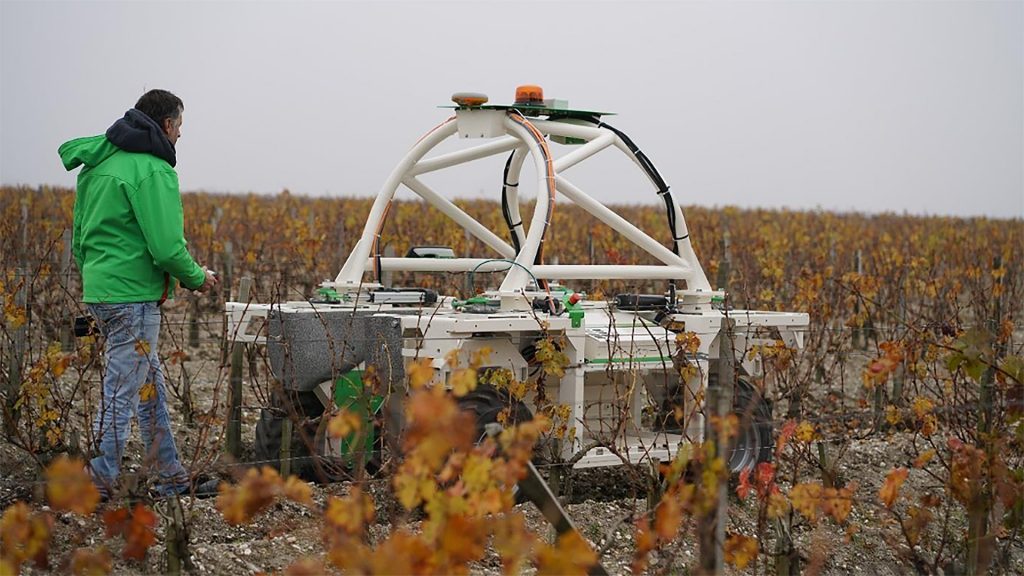Key Takeaway
The wine industry may be one of the oldest in the world, but it’s begun to dive into AI technology in an effort to optimize vineyards and production processes, and gain a better understanding of customer tastes and preferences, through companies like VineScout and Alilytic.
Decanter.com, the online destination for all things wine and vineyards, recently reported on tech innovation at Bordeaux-based winery Château Clerc Milon. The team recently piloted it’s very first vineyard robot, by the name of Ted.
While the robot won’t go so far as to select appropriate grapes (this remains the job of well-versed human hands), it does collect data and aid with soil cultivation, weeding, and reduction of the amount of repetitive and laborious work that may infringe upon the wellbeing of workers.
This shift, although exciting, isn’t necessarily groundbreaking. However, it’s only now being implemented across the industry.
We see robotics as an effective solution for the future. ‘As well as helping to make our vineyard work less arduous and respecting the soil, it will reduce our dependency on fossil energies and the harm caused by traditional agricultural machinery.’

Data mining at Palmaz Vineyards
Palmaz Vineyards in Napa Valley is leveraging big data to produce what Christian Palmaz considers the most optimal bottle of wine. His system VIGOR, combined with a software he calls FILICS, uses a combination of sensors, probes and x-rays, to gather and analyze millions of data points that help standardize and improve vine growth, detect problems such as viruses, insects, or broken water pipes before they can impede growth, as well as inform the best conditions for wine fermentation, production and storage.
“One of the challenges we have in winemaking is that it takes an incredible amount of time. You’re building on what you’ve done just yesterday for two to two-and-a-half years. When you get to the finish line and you’re presented with these raw ingredients, you struggle to know what single point is responsible for the things we’re proud of versus what we’re not so proud of.” – Christian Palmaz
“Right now I’m seeing…humans being more tuned into the winemaking process than I’ve ever seen before. This is where we need to go…Differentiation is everything, and if we fall asleep at the wheel –our industry has a tendency to do that – we could lose ground. We have to be careful and stay aware of what our customers want.”
VineScout enables more precise vitoculture
In early August, VineScout, a project funded by the European Union for Research & Innovation, had its open-air launch. VineScout is another robot that specifically collects data on water stress and vine health, enabling more informed and data-driven decisions.

Wine is a $300 billion industry, and so far, only a handful of startups have been making big waves in this niche area.
Room for innovation: consumer-facing
Standing bewildered in front of a wall of wines options is a nearly universal experience for those less cultured wine-os of the world. Startup Vivino’s mission is to address this issue by “taking the guesswork out of wine shopping”. Shoppers can take a photo of any wine label in front of them to access pricing, reviews, pairing suggestions and other information. Over time, the app also provides users with a personalized taste profile based on their selections.
Vivino by the numbers; source: HuffPost
Other startups are looking to improve the at-home experience, from new aerators and storage devices, to personalized subscription services like Penrose Hill and “honesty-driven” Vinomofo that use machine learning to recommend wines for users, and Myoeno, an IoT device that connects to a smartphone app to tell users more about what they’re drinking and offer recommendations.
Access to virtual assistants like Siri and Amazon Alexa, and virtual sommeliers, may also impact wine sales by continuing to learn consumer preferences and selecting items their users like.

AI in the production line
There is also a definitive need for innovation along every part of the wine-making process.
Alilytic, a South Australia-based tech firm, couples AI with production algorithms to streamline the winemaking process, increasing production efficiency by optimizing machine use. They were recently used by a number of winemakers (their preferred customer base) who claim that the service is specifically helpful for determining changeover, managing inventory, and ensuring that there is no contamination.
People think of wine as a romantic, artisan type of process, and it is, when you are producing small batch, but the majority of wines we drink are mass manufactured in big operations. That's where we come in – the more complex the business, the bigger the benefit.
As the climate continues to change, alongside technology developing to further optimize wine production (some like Ava Winery even claiming to produce wine without grapes), consumers have more brands and variations of wine to choose from than ever before. Will sommeliers still have a place in the world of the future? What does this indicate about the future of brands and regions that rely heavily on wine production to survive?

